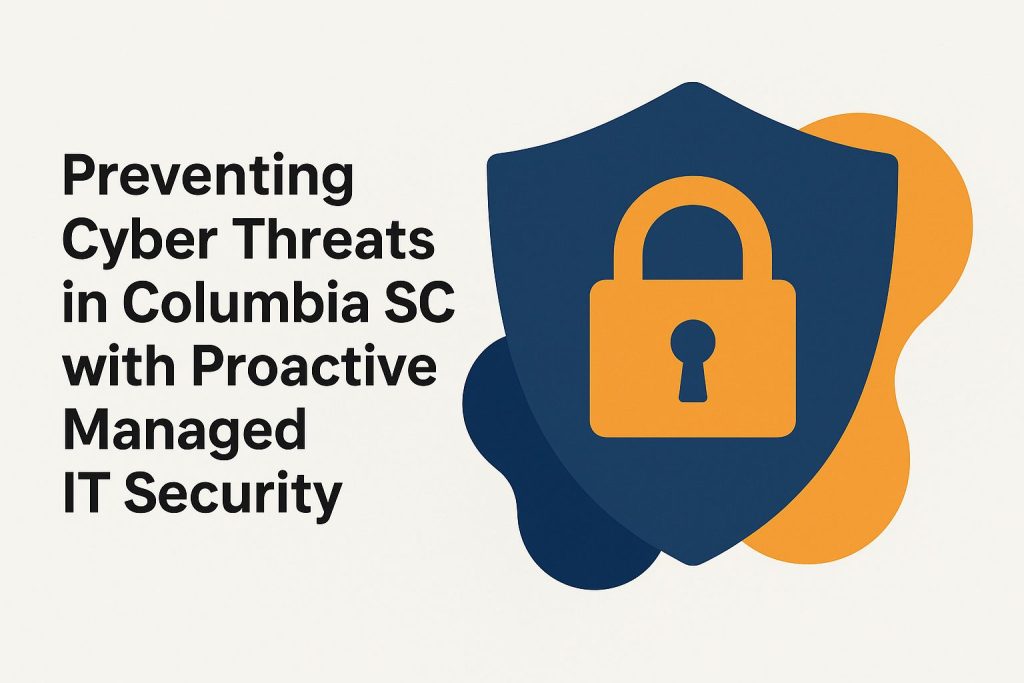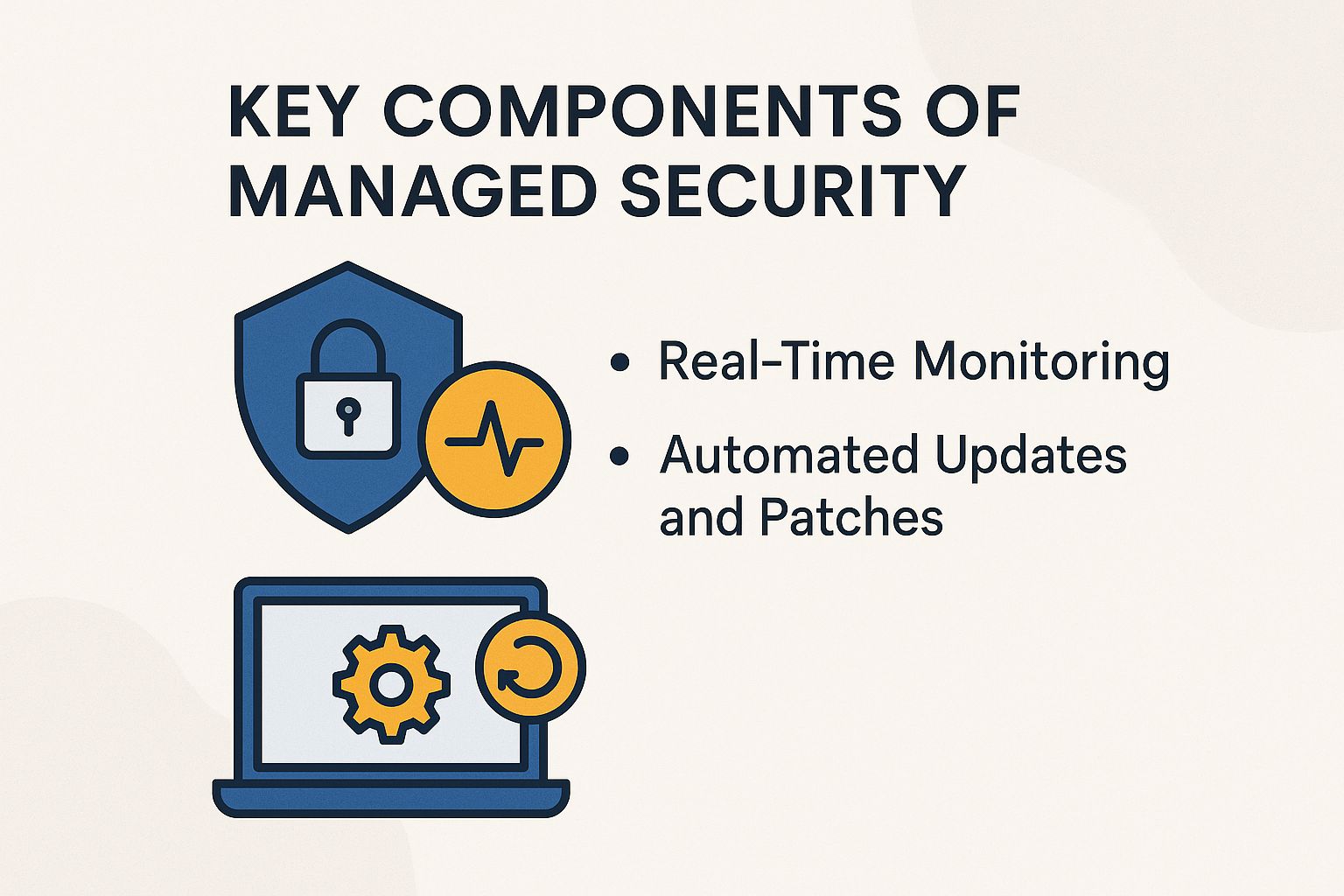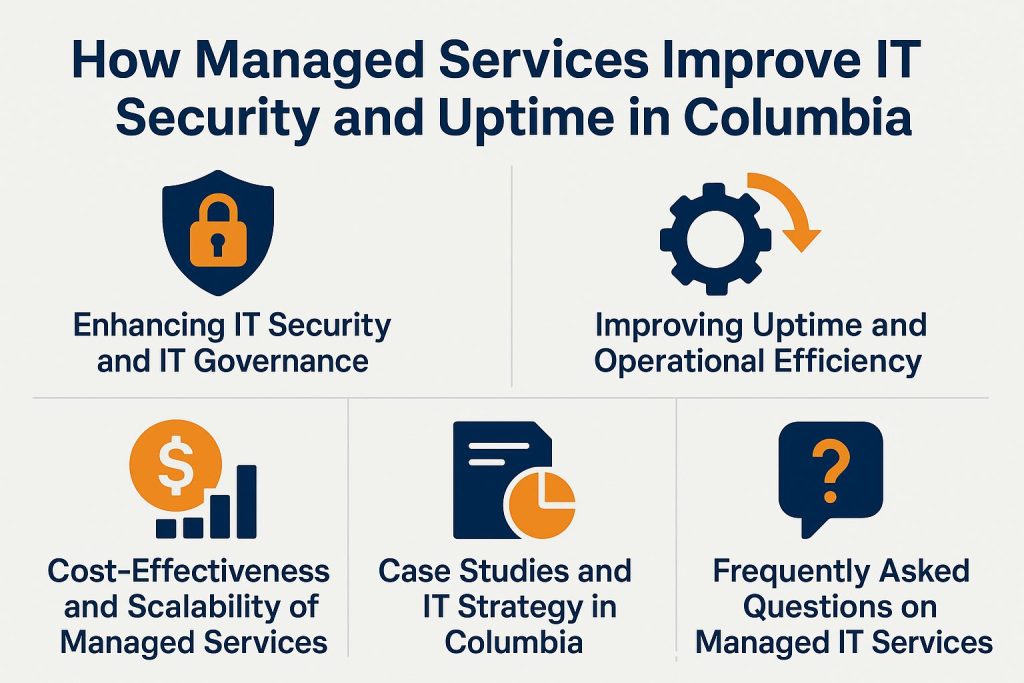Preventing Cyber Threats in Columbia SC with Proactive Managed IT Security

Small businesses drive Columbia, SC’s economy. A phishing scam or ransomware attack can destroy years of work in seconds. The FBI reports average losses of $4.45 million per incident. Proactive managed IT security acts as the main defense. It protects data with careful strategies for local risks. This overview covers common threats. It explains key parts like real-time monitoring and automated patches. It includes steps to implement and tips to choose a trusted provider.
Understanding Proactive Managed IT Security
Proactive managed IT security hunts for threats all the time. It uses tools like Splunk for SIEM. SIEM manages security information and events. A 2023 Gartner study shows it cuts breach risks by 60%. Reactive methods wait for incidents to happen. They fix problems only after damage occurs.
The NIST Cybersecurity Framework stresses prevention first. It uses layered defenses for proactive security. The table below shows key differences:
| Aspect | Proactive | Reactive |
|---|---|---|
| Core Strategy | Predictive analytics, zero trust, 24/7 monitoring | Firefighting breaches, higher downtime |
For example, Network Computing Solutions is a Columbia, SC-based MSP. It ensures compliance with South Carolina’s cybersecurity laws. It implements automated vulnerability scans.
To uncover how proactive approaches save 40% on costs through automation and efficiency, explore the top benefits of managed IT services for Columbia small businesses. Forrester’s 2022 study reports it. They also speed up threat detection. Plus, they boost resource efficiency.
Common Local Threats: Phishing and Ransomware
Phishing attacks rose 35% in South Carolina in 2022. The FBI’s IC3 report confirms this. Columbia businesses lost an average of $150,000 from ransomware. The Ryuk variant hit local healthcare providers.
Common phishing techniques target users. Spear-phishing uses fake emails like “SC Utilities” invoices. These steal credentials. Vishing involves fake IT support calls. Smishing sends texts that trick users into downloading bad apps.
KnowBe4’s 2023 study shows a 300% return on investment. Security awareness training provides this. It cuts phishing click rates by 50%.
The WannaCry ransomware attacked SMBs in South Carolina. It exploited vulnerabilities. It used AES-256 encryption to lock data. IBM reports average recovery costs at $1.85 million. Businesses also faced weeks of downtime.
Prevention measures include implementing multi-factor authentication (MFA), which is currently adopted by only 30% of SMBs, as well as following guidelines from the Cybersecurity and Infrastructure Security Agency (CISA) available at cisa.gov/secure-our-world-this approach has significant implications for local protection, and our guide to the top cybersecurity threats in Columbia & how to prevent them demonstrates practical strategies tailored to businesses like yours.
Key Components of Managed Security

Managed security services integrate key components such as Cisco Meraki firewalls and Snort-based intrusion detection systems to establish a comprehensive defense-in-depth approach. This strategy ensures alignment with ISO 27001 standards, providing robust protection tailored to businesses in Columbia. For more information, see the related insight on Columbia IT Services and Managed IT Solutions.
Real-Time Monitoring
Real-time monitoring uses SIEM tools like IBM QRadar. It spots unusual activity in seconds. This prevents 70% of advanced persistent threats (APTs). A 2022 Ponemon study on SOCs supports this.
Effective implementation begins with selecting accessible SIEM solutions, including Splunk’s free tier for smaller environments or SolarWinds for on-premises deployments. Organizations should configure dashboard metrics, such as alert thresholds for over 100 events per hour, to detect suspicious patterns at an early stage.
The setup process encompasses four essential steps:
- Integrate logs from endpoints and networks via agents or APIs.
- Set up AI rules for threat intelligence. Use feeds that match CISA’s continuous diagnostics guidelines.
- Activate real-time alerts through integrations with platforms like Slack or Microsoft Teams.
- Perform daily reviews to enhance detection precision.
For example, a retail firm in Columbia avoided a $200,000 loss. They used MDR services from a local MSP. This shows the strong benefits of proactive SIEM deployment.
Automated Updates and Patches
Automated patching uses tools like Microsoft WSUS or Ivanti. It cuts exploit windows from days to hours. This fixes 95% of vulnerabilities. A 2023 SANS Institute report shows this.
For effective implementation, organizations should follow these structured steps:
- List all assets with the Nessus scanner. It costs $2,500 per year. Find all endpoints and vulnerabilities.
- Schedule automated updates with Automox (starting at $99 per device per year) during off-peak hours to minimize disruptions.
- Test patches in a staging environment that simulates production loads.
- Deploy patches with rollback plans in place, while monitoring for issues through integrated logs.
Avoid common mistakes. Do not ignore third-party software. Adobe Flash exploits caused 30% of breaches, per Verizon’s 2023 DBIR. A South Carolina plant stopped an Emotet infection. They followed routines. This matches NIST SP 800-40 guidelines. Apply patches within 48 hours.
Benefits for Columbia Businesses
Columbia businesses use managed security services. They face 50% fewer incidents. They save $300,000 each year. A 2023 Deloitte study reports this for small and medium businesses.
Managed security cuts downtime from 48 hours to 4 hours per breach. It reduces disruptions. A Columbia law firm used MSP solutions. They stayed PCI DSS compliant. They avoided $100,000 fines from cyber threats.
Key benefits of managed security include:
- Cost efficiency, providing a 300% return on investment through proactive threat prevention;
- Scalability to support remote workforces with cloud-based monitoring;
- Alignment with South Carolina data breach notification laws, facilitating prompt incident reporting.
Business owners curious about how these advantages play out for small operations in the area might appreciate exploring the Benefits of Managed IT Services for Columbia Small Businesses.
An initial investment of $5,000 in tools such as endpoint detection software can yield $50,000 in savings during the first year by preventing potential losses.
Implementation Steps
The implementation of managed security services commences with a vulnerability assessment, utilizing tools such as Qualys (approximately $2,000 per year), which identifies 80% of risks in the initial scan, according to a 2022 Gartner benchmark.
Organizations should adhere to the following numbered steps to achieve full implementation:
- Do a full risk assessment with the NIST framework. It takes 1-2 weeks. Map threats to your assets.
- Engage a managed service provider (MSP), such as local options in Columbia like AOS, to handle ongoing monitoring (contracts commencing at $5,000 per year).
- Deploy endpoint security solutions using CrowdStrike Falcon ($59.99 per device per year), which blocks 99% of known threats based on the provider’s 2023 efficacy report.
- Provide employee training through the KnowBe4 platform, resulting in 90% phishing resistance following completion (courses priced at $20 per user per year).
- Run penetration tests with Metasploit. The full timeline is 4-6 weeks. Avoid errors like skipping backups. Use Veeam for data recovery. This follows ISO 27001 standards for better resilience.
Choosing a Local Provider
Choose an MSP in Columbia. Pick ones certified in NIST and ISO 27001. Look for local firms with 24/7 SOC monitoring. A 2023 IDC survey shows this cuts breaches by 65%.
| Provider | Pricing | Key Services | Best For | Pros/Cons |
|---|---|---|---|---|
| AOS | $250/user/mo | MDR, compliance audits | SMBs | Pros: 24/7 local response; Cons: Higher cost |
| Carolina Digital Solutions | $150/user/mo | SOC monitoring, cybersecurity training | Enterprises | Pros: Scalable; Cons: Slower onboarding |
| Columbia IT Pros | $120/user/mo | Network audits, threat detection | SMBs | Pros: Affordable; Cons: Limited integrations |
| Apex Managed Services | $200/user/mo | Full MDR, vulnerability scans | Enterprises | Pros: Fast response; Cons: Contract rigidity |
Evaluate providers using key criteria. Look for NIST/ISO 27001 certifications. Ensure response times are under 15 minutes per SLA. Check client reviews. For example, AOS scores 4.8/5 on Clutch. Verify BBB ratings for Columbia firms. AOS holds an A+ status.
Ask about zero trust implementation. A 2022 local case study showed 48-hour delays in breach response. This happened due to choosing the wrong MSP.
Frequently Asked Questions
What is proactive managed IT security for preventing cyber threats in Columbia SC?
Proactive managed IT security monitors systems continuously. It detects threats early. It uses preventive measures for Columbia SC businesses. Tools include firewalls and intrusion detection systems. Regular assessments check vulnerabilities. This prevents cyber threats. It reduces downtime and protects data from risks.
Why prioritize proactive managed IT security to prevent cyber threats in Columbia SC?
Columbia SC businesses face rising cyber risks. These include ransomware, phishing, and data breaches. The digital economy grows in the region. Prioritize proactive managed IT security. It helps stay ahead of attackers. Companies comply with local rules. They protect sensitive data. This cuts financial losses and reputational harm.
How does proactive managed IT security help in preventing cyber threats in Columbia SC?
Proactive managed IT security applies AI analytics. Experts oversee 24/7. They spot and stop threats early. This avoids operational impacts. In Columbia SC, healthcare and finance face high risks. The approach patches vulnerabilities. It trains staff on best practices. Thus, it prevents cyber threats.
What are the common cyber threats facing organizations in Columbia SC, and how can proactive managed IT security address them?
Columbia SC sees common threats. These are phishing, malware, and insider risks. The tech sector expands and worsens them. Proactive managed IT security fights back. It deploys multi-layered defenses. Examples include endpoint protection and access controls. This prevents cyber threats. It ensures business continuity.
Who benefits most from implementing proactive managed IT security for preventing cyber threats in Columbia SC?
SMEs, healthcare providers, and financial institutions in Columbia SC benefit most. They often lack internal experts. Outsourcing to specialists provides strong defenses. This prevents cyber threats. It lets businesses focus on growth. They reduce cyber risk exposure.
How can a company in Columbia SC get started with proactive managed IT security to prevent cyber threats?
Start with an IT audit. Assess current vulnerabilities. Then, partner with a local provider. Choose one experienced in the area. This creates custom strategies. They prevent cyber threats. Include regular updates and training. Build a strong cybersecurity setup.




